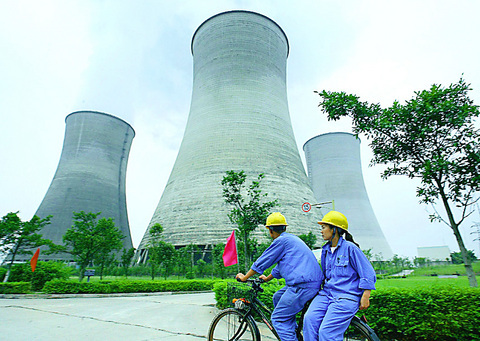In its anxiety to satisfy its seemingly bottomless demand for electricity, China plans to build nuclear reactors on a scale and pace comparable to the most ambitious nuclear energy programs the world has ever seen.
Current plans -- conservative ones, in the estimation of some people involved in China's nuclear energy program -- call for new reactors to be commissioned at a rate of nearly two a year between now and 2020, a pace that experts say is comparable to the peak of the US' nuclear energy push in the 1970s.

PHOTO: AFP
"We will certainly build more than one reactor per year," said Zhou Dadi, director of the central government's Energy Research Institute, which has strongly supported the country's nuclear program.
"The challenge is not the technology. The barriers for China are mostly institutional arrangements, because reactors are big projects. What we need most is better operation, financing and management," Zhou said.
By 2010, planners predict a quadrupling of nuclear output to 16 billion kilowatt-hours and a doubling of that figure by 2015. And with commercial nuclear energy programs dead or stagnant in the US and most of Europe, Western and other developers of nuclear plant technology are lining up to sell reactors and other equipment to China, whose purchasing decisions alone will determine in many instances who survives in the business.
The problem with nuclear power, some experts say, is that China's energy needs are so immense that even the enormous expansion program will do little to offset the skyrocketing power demand.
China's eight nuclear reactors in operation today supply less than 2 percent of current demand. By 2020, assuming the national plan is fulfilled, nuclear energy would still constitute under 4 percent of demand.
There has been almost no public discussion of the merits and risks of nuclear energy here, as the government strictly censors news coverage of such issues. But critics of the program question whether such a small payoff warrants exposure to the risks.
"We don't have a very good plan for dealing with spent fuel, and we don't have very good emergency plans for dealing with catastrophe," said Wang Yi, a nuclear energy expert at the Chinese Academy of Sciences in Beijing.
Chinese nuclear operators, like the people who run the plans at Daya Bay, scoff at such concerns.
"In China we have state-owned power companies, whereas abroad they have private companies," said Yu Jiechun, a senior engineer at the China Guangdong Nuclear Power Holding Co.
"It's not a matter of someone's profit here, whether we do something one way or another. The government decides, and they have spent huge amounts of money on safety," Yu said.

CHIP WAR: Tariffs on Taiwanese chips would prompt companies to move their factories, but not necessarily to the US, unleashing a ‘global cross-sector tariff war’ US President Donald Trump would “shoot himself in the foot” if he follows through on his recent pledge to impose higher tariffs on Taiwanese and other foreign semiconductors entering the US, analysts said. Trump’s plans to raise tariffs on chips manufactured in Taiwan to as high as 100 percent would backfire, macroeconomist Henry Wu (吳嘉隆) said. He would “shoot himself in the foot,” Wu said on Saturday, as such economic measures would lead Taiwanese chip suppliers to pass on additional costs to their US clients and consumers, and ultimately cause another wave of inflation. Trump has claimed that Taiwan took up to

A start-up in Mexico is trying to help get a handle on one coastal city’s plastic waste problem by converting it into gasoline, diesel and other fuels. With less than 10 percent of the world’s plastics being recycled, Petgas’ idea is that rather than letting discarded plastic become waste, it can become productive again as fuel. Petgas developed a machine in the port city of Boca del Rio that uses pyrolysis, a thermodynamic process that heats plastics in the absence of oxygen, breaking it down to produce gasoline, diesel, kerosene, paraffin and coke. Petgas chief technology officer Carlos Parraguirre Diaz said that in

SUPPORT: The government said it would help firms deal with supply disruptions, after Trump signed orders imposing tariffs of 25 percent on imports from Canada and Mexico The government pledged to help companies with operations in Mexico, such as iPhone assembler Hon Hai Precision Industry Co (鴻海精密), also known as Foxconn Technology Group (富士康科技集團), shift production lines and investment if needed to deal with higher US tariffs. The Ministry of Economic Affairs yesterday announced measures to help local firms cope with the US tariff increases on Canada, Mexico, China and other potential areas. The ministry said that it would establish an investment and trade service center in the US to help Taiwanese firms assess the investment environment in different US states, plan supply chain relocation strategies and

Japan intends to closely monitor the impact on its currency of US President Donald Trump’s new tariffs and is worried about the international fallout from the trade imposts, Japanese Minister of Finance Katsunobu Kato said. “We need to carefully see how the exchange rate and other factors will be affected and what form US monetary policy will take in the future,” Kato said yesterday in an interview with Fuji Television. Japan is very concerned about how the tariffs might impact the global economy, he added. Kato spoke as nations and firms brace for potential repercussions after Trump unleashed the first salvo of